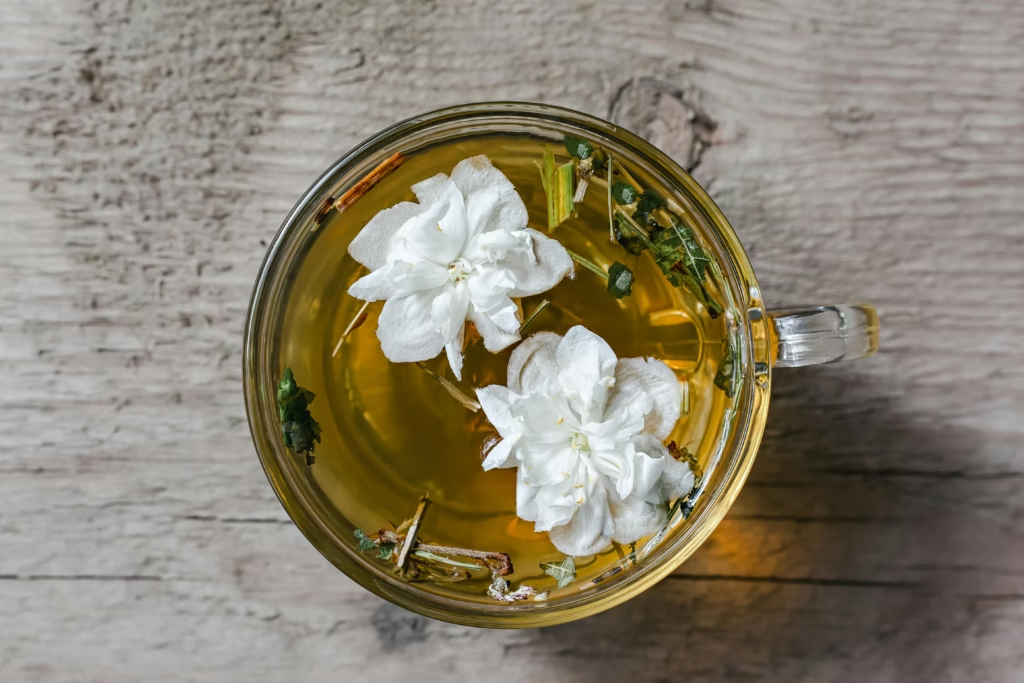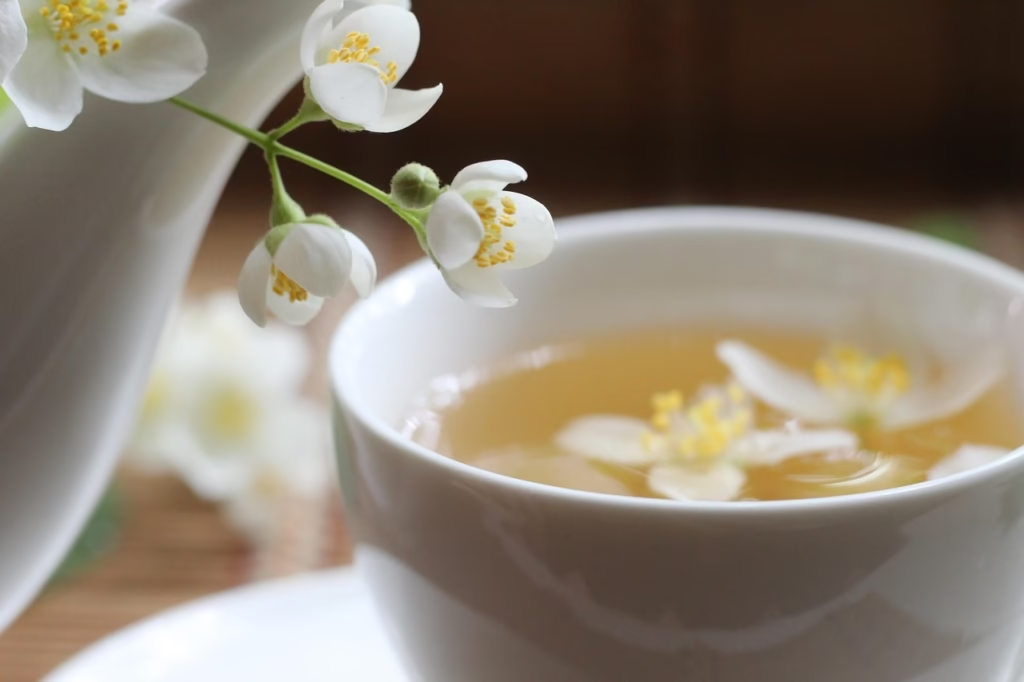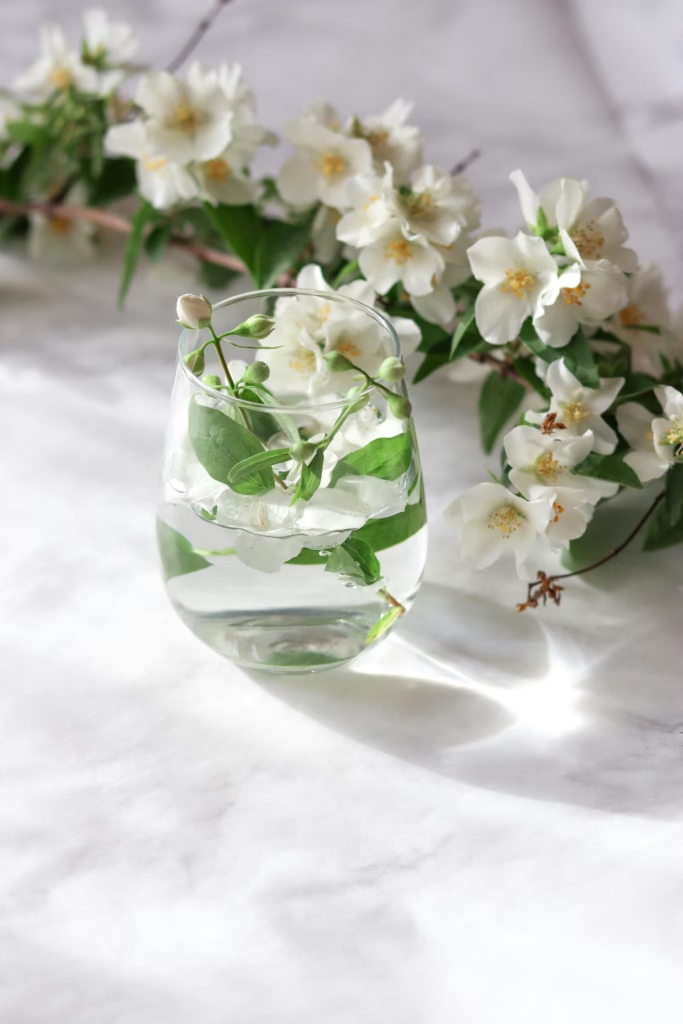Fragrant, soothing, and deeply rooted in tradition—jasmine tea is more than just a beverage. It’s a ritual of relaxation, a natural boost for your health, and a fragrant journey that combines the earthy strength of tea with the delicate sweetness of jasmine blossoms. For centuries, this tea has been treasured in China and across Asia, where it’s often enjoyed during meals or as a calming drink before bedtime.
In this complete guide, we’ll explore what jasmine tea is, its rich history, how it’s made, and—most importantly—the science-backed benefits it offers for your body and mind. You’ll also discover tips on brewing the perfect cup, possible side effects, and ways to incorporate jasmine tea into your daily wellness routine.

What Exactly is Jasmine Tea?
Jasmine tea isn’t a type of tea plant on its own—it’s an aromatic blend. Typically, it’s green tea leaves that have been infused with the natural scent of jasmine blossoms. The flowers are layered over freshly processed tea leaves, allowing the fragrance and oils of the flowers to be absorbed naturally. The flowers are then removed, but their perfume lingers in the tea.
Though green tea is the most common base, jasmine tea can also be made with black, oolong, or even white tea. The choice of base determines how strong, sweet, or delicate the final brew tastes.
This careful blending process dates back to the Song Dynasty in China (around the 10th century), where jasmine tea became popular as a symbol of refinement and balance.
Key Jasmine Tea Benefits for Health and Wellness
1. Rich in Antioxidants That Protect Your Body
The combination of tea polyphenols (like catechins) and jasmine’s natural compounds makes this tea a powerhouse of antioxidants. These molecules fight oxidative stress, reducing cell damage that can lead to chronic diseases.
Antioxidants in jasmine tea are linked to:
- Improved skin health by slowing down signs of aging
- Reduced inflammation in the body
- Better defense against free radical damage
2. A Natural Mood Booster and Stress Reliever
The scent of jasmine is not only pleasant—it has measurable effects on the nervous system. Studies have shown that jasmine aroma can reduce heart rate, ease stress, and promote relaxation. Drinking jasmine tea before bed or during stressful times can help you unwind naturally.
3. Supports Heart Health
Research suggests that drinking jasmine tea regularly may reduce LDL (“bad”) cholesterol and increase HDL (“good”) cholesterol. Its antioxidants also improve blood circulation and reduce blood pressure, supporting long-term cardiovascular wellness.
4. Assists with Weight Management
Like green tea, jasmine tea can help boost metabolism and promote fat burning. Drinking a cup before exercise or as part of your daily routine may help accelerate calorie burning while giving you a mild, natural energy lift.
5. Strengthens the Immune System
Packed with anti-inflammatory compounds, jasmine tea helps your body fight common colds and infections. Some studies also suggest that its antibacterial properties contribute to better oral health by reducing plaque and harmful bacteria in the mouth.
6. Enhances Cognitive Function
Jasmine tea contains caffeine in moderate amounts, giving a gentle boost in focus and alertness without the jitteriness associated with coffee. Combined with L-theanine in tea leaves, it promotes calm concentration—ideal for work or study.
7. Promotes Healthy, Glowing Skin
Regular consumption of jasmine tea improves circulation and delivers antioxidants that protect the skin from damage. This results in a clearer complexion and reduced risk of premature aging caused by free radicals.

How to Brew Jasmine Tea for the Perfect Cup
To enjoy all its benefits, you need to brew jasmine tea correctly:
- Water temperature: Around 80°C (175°F) for green tea bases, slightly hotter for oolong or black tea bases.
- Steeping time: 2–3 minutes for green jasmine tea, 3–4 minutes for oolong or black jasmine tea.
- Tip: Avoid over-steeping, as this can make the tea bitter.
- Best time to drink: In the morning for energy, or evening for relaxation.
Different Types of Jasmine Tea You Can Try
- Jasmine Green Tea – The most common, light and floral with a refreshing aftertaste.
- Jasmine Black Tea – Stronger, with bold flavors balanced by floral notes.
- Jasmine Oolong Tea – A unique combination of rich and delicate, offering both earthiness and fragrance.
- Jasmine White Tea – Subtle, sweet, and very delicate—perfect for those who prefer a mild cup.

Possible Side Effects of Jasmine Tea
While jasmine tea is safe for most people, moderation is key:
- Caffeine sensitivity: Too much can cause restlessness or insomnia.
- Pregnancy: High caffeine intake should be avoided.
- Acidity: Drinking jasmine tea on an empty stomach may cause discomfort for sensitive individuals.
Helpful Links for Further Reading
- Healthline – Jasmine Tea: Benefits and Uses
- Medical News Today – Jasmine Tea: Health Benefits and Nutrition
Final Thoughts
Jasmine tea is not just a drink—it’s an experience of aroma, taste, and health benefits. From protecting your heart and skin to boosting your mood and metabolism, this floral infusion offers a natural path to wellness.
Whether you enjoy it as a calming ritual after a stressful day, a morning pick-me-up, or a fragrant companion during work, jasmine tea delivers much more than flavor. It provides a tradition of wellness in every cup.
Disclaimer
This article is for informational purposes only and should not replace medical advice. Always consult a healthcare provider before making major changes to your diet or lifestyle.

